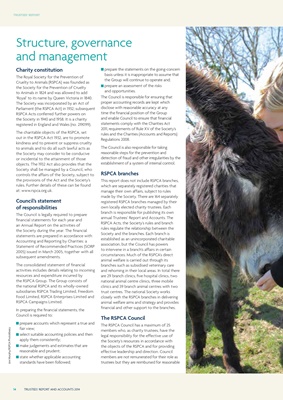
TRUSTEES' REPORT AND ACCOUNTS 2014
14
TRUSTEES' REPORT
Charity constitution
The Royal Society for the Prevention of
Cruelty to Animals (RSPCA) was founded as
the Society for the Prevention of Cruelty
to Animals in 1824 and was allowed to add
'Royal' to its name by Queen Victoria in 1840.
The Society was incorporated by an Act of
Parliament (the RSPCA Act) in 1932; subsequent
RSPCA Acts conferred further powers on
the Society in 1940 and 1958. It is a charity
registered in England and Wales (no. 219099).
The charitable objects of the RSPCA, set
out in the RSPCA Act 1932, are to promote
kindness and to prevent or suppress cruelty
to animals and to do all such lawful acts as
the Society may consider to be conducive
or incidental to the attainment of those
objects. The 1932 Act also provides that the
Society shall be managed by a Council, who
controls the affairs of the Society, subject to
the provisions of the Act and the Society's
rules. Further details of these can be found
at: www.rspca.org.uk.
Council's statement
of responsibilities
The Council is legally required to prepare
financial statements for each year and
an Annual Report on the activities of
the Society during the year. The financial
statements are prepared in accordance with
Accounting and Reporting by Charities: a
Statement of Recommended Practices (SORP
2005) issued in March 2005, together with all
subsequent amendments.
The consolidated statement of financial
activities includes details relating to incoming
resources and expenditure incurred by
the RSPCA Group. The Group consists of
the national RSPCA and its wholly-owned
subsidiaries RSPCA Trading Limited, Freedom
Food Limited, RSPCA Enterprises Limited and
RSPCA Campaigns Limited.
In preparing the financial statements, the
Council is required to:
prepare accounts which represent a true and
fair view;
select suitable accounting policies and then
apply them consistently;
make judgements and estimates that are
reasonable and prudent;
state whether applicable accounting
standards have been followed;
prepare the statements on the going-concern
basis unless it is inappropriate to assume that
the Group will continue to operate and;
prepare an assessment of the risks
and opportunities.
The Council is responsible for ensuring that
proper accounting records are kept which
disclose with reasonable accuracy at any
time the financial position of the Group
and enable Council to ensure that financial
statements comply with the Charities Act
2011, requirements of Rule XV of the Society's
rules and the Charities (Accounts and Reports)
Regulations 2008.
The Council is also responsible for taking
reasonable steps for the prevention and
detection of fraud and other irregularities by the
establishment of a system of internal control.
RSPCA branches
This report does not include RSPCA branches,
which are separately registered charities that
manage their own affairs, subject to rules
made by the Society. There are 164 separately
registered RSPCA branches managed by their
own locally elected charity trustees. Each
branch is responsible for publishing its own
annual Trustees' Report and Accounts. The
RSPCA Acts, the Society's rules and branch
rules regulate the relationship between the
Society and the branches. Each branch is
established as an unincorporated charitable
association, but the Council has powers
to intervene in a branch's affairs in certain
circumstances. Much of the RSPCA's direct
animal welfare is carried out through its
branches such as subsidised veterinary care
and rehoming in their local areas. In total there
are 29 branch clinics, five hospital clinics, two
national animal centre clinics, three mobile
clinics and 39 branch animal centres with two
trust centres. The national Society works
closely with the RSPCA branches in delivering
animal welfare aims and strategy and provides
financial and other support to the branches.
The RSPCA Council
The RSPCA Council has a maximum of 25
members who, as charity trustees, have the
legal responsibility for the effective use of
the Society's resources in accordance with
the objects of the RSPCA and for providing
effective leadership and direction. Council
members are not remunerated for their role as
trustees but they are reimbursed for reasonable
Structure, governance
and management
Joe Murphy/RSPCA Photolibrary